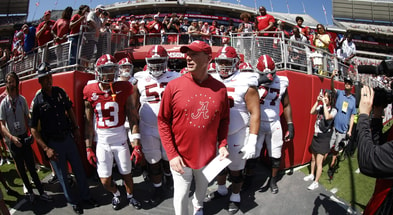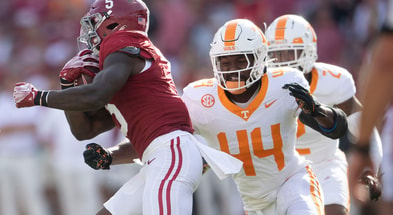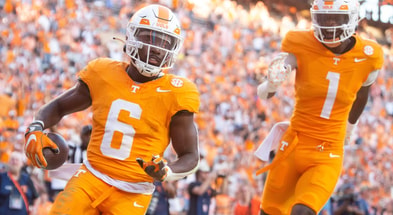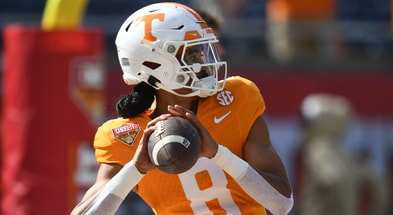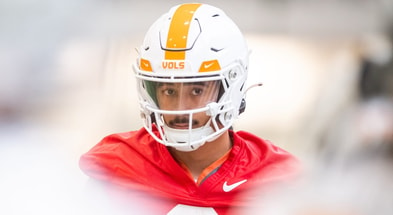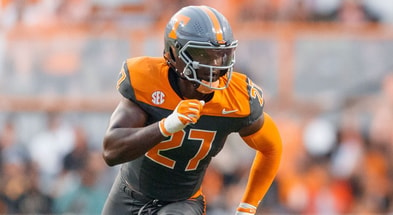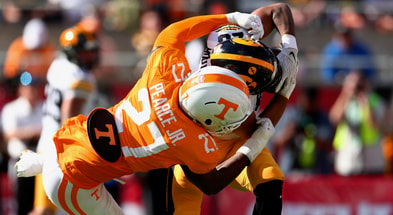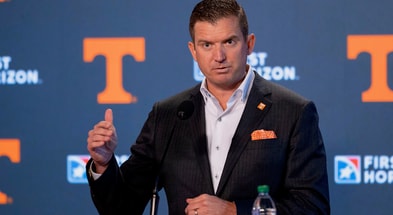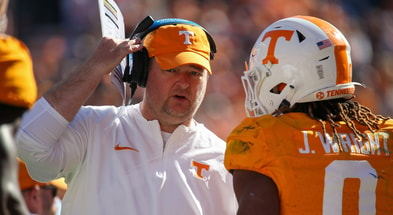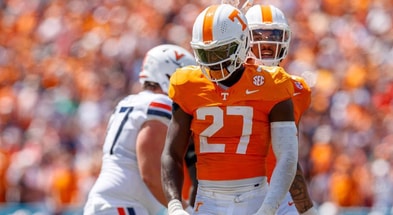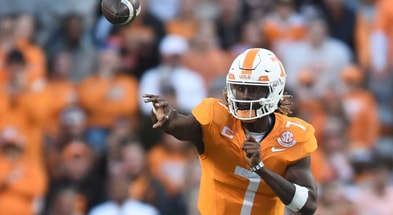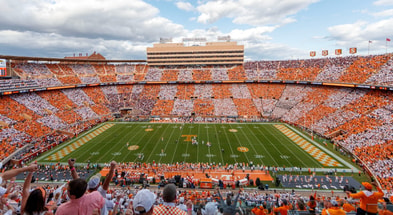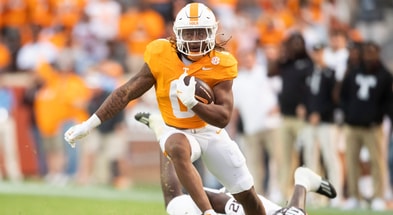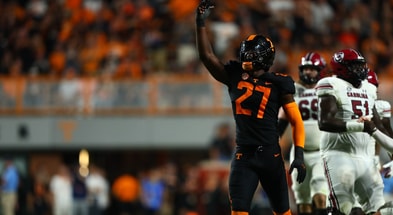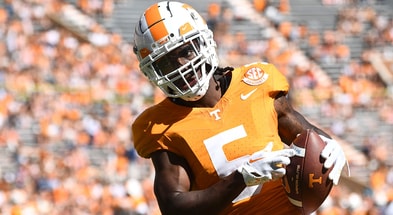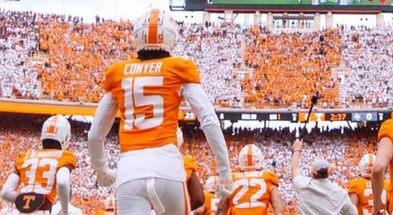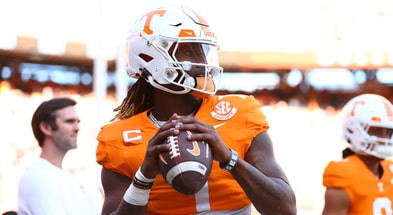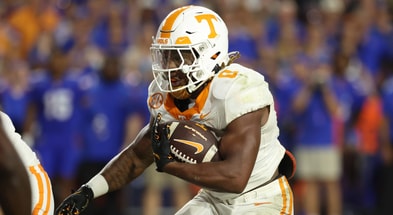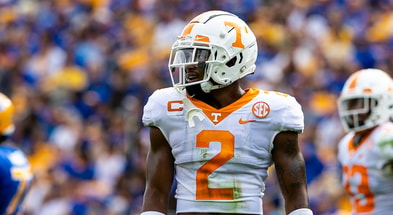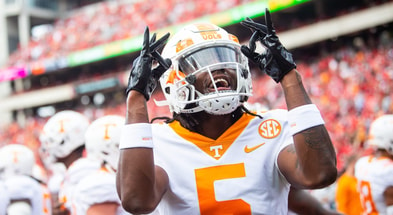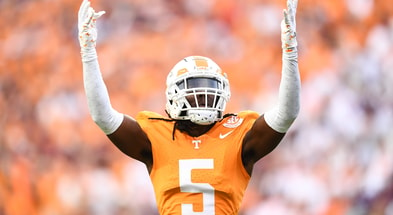Read: Tennessee football's full infractions decision and penalties from the NCAA
The NCAA on Friday released its full finding from the investigation into the Tennessee football program under former head coach Jeremy Pruitt and the 18 Level I violations that occurred on his watch.
There were more than 200 individual infractions, according to the NCAA’s report, “involving recruiting rules violations and direct payments to prospects, current student-athletes and their families” according to the Division I Committee on Infractions panel.
There were also four Level I unethical conduct violations committed by Pruitt and his staff, resulting in impermissible benefits totaling approximately $60,000. The NCAA ruled that Tennessee failed to monitor its football program, giving the Vols five years of probation, an $8 million fine, scholarship reductions and recruiting limitations over the term of probation.
Here’s the full release from the NCAA (the full University of Tennessee Public Infractions Decision can be seen here):
Impermissible paid visits
The majority of the violations in this case relate to a paid unofficial visit scheme that was used in a consistent manner by the football program over the course of two years. In total, the scheme involved 29 prospects, 39 members of those prospects’ families, 10 then-enrolled student-athletes, three family members of then-enrolled student-athletes, nine individuals associated with a prospect (e.g., a high school coach or nonscholastic coach), and three boosters. The scheme also involved at least a dozen members of the football staff, and the resulting violations included at least 110 impermissible hotel room nights, 180 impermissible meals, 72 instances of providing impermissible entertainment or other benefits, 41 impermissible recruiting contacts, 37 instances of providing impermissible game day parking, and 14 times in which gear was impermissibly provided to prospects.
Before a prospect’s visit, the former recruiting director worked with an assistant coach who was the prospect’s primary recruiter and arranged hotel rooms, which would then be paid for in cash before the prospect’s arrival. The recruiting staff also regularly called ahead to restaurants or entertainment venues and asked them to hold the bill from a prospect’s visit. After the prospect left, a football staff member would stop by to pay the bill in cash. During the Committee on Infractions hearing, the former recruiting director acknowledged that the funding for these visits was frequently provided by a former assistant coach (“former assistant coach 1”) and a former director of player personnel.
Before the COVID-19 pandemic, the recruiting staff concealed the impermissible visits from Tennessee’s compliance department by creating two itineraries. One version would be submitted to compliance and only contained permissible activities. A second version would include the additional activities, meetings and other benefits.
NCAA member-approved rules for recruiting and unofficial visits prohibit schools from covering expenses for prospects during unofficial visits, so the school’s funding of these benefits constitutes impermissible recruiting inducements.
During the pandemic, when NCAA members implemented a recruiting dead period to protect the health and safety of student-athletes, prospects and athletics department staff members, the program continued to plan and fund these visits in violation of dead period rules. On nine separate occasions, the football program arranged visits for six prospects and their companions. The football staff did not inform compliance when prospects were visiting the campus and often arranged activities in the Knoxville area, occasionally asking enrolled student-athletes to host prospects. Once students returned to campus, the recruiting staff arranged activities farther from campus.
Direct payments to prospects, student-athletes and their families
In addition to the impermissible paid visits, two prospects, who later enrolled as student-athletes, received cash payments from the former head coach and/or his wife.
Prospect 1
During the prospect’s recruitment, the former head coach or his wife — who is not named as an involved individual in this case — provided the prospect’s mother with $6,000 in cash, intended to be a downpayment on a new car for her, which is also a violation of NCAA rules and a recruiting inducement.
After the prospect signed a National Letter of Intent and enrolled at the university, the head coach’s wife continued to provide his mother with $500 in cash each month for car payments on at least 25 occasions. The head coach’s wife also introduced her to a real estate agent, who also was a Tennessee booster, to assist her with finding a rental home in the Knoxville area. When the student-athlete’s mother signed her lease, $1,550 was due at signing, and the head coach’s wife provided her with $1,600 in cash to pay the deposit. The head coach’s wife also arranged for another $1,600 payment to be made to the prospect’s mother by assistant coach 1 when she moved into the rental property later that month.
As a result of these cash payments and inducements during his impermissible paid visits, the prospect went on to compete in 23 games while ineligible, including a bowl game.
Prospect 2
Prospect 2 enrolled at Tennessee and was accompanied by his mother and sister when he moved in. During this trip, his mother informed the head coach that she needed a medical procedure but could not pay for it due to outstanding medical debt. Before her departure from Knoxville, the head coach handed her an envelope with approximately $3,000 in cash, which the mother used to pay for medical bills.
Records obtained by the school during its investigation indicate that the prospect’s mother deposited $5,100 into her bank account, only two days after the former head coach’s bank account shows a cash withdrawal of a similar amount ($5,000). Additionally, the head coach gave the prospect’s mother $300 in cash to pay for gas.
As result of these cash payments and inducements during his impermissible paid visits, the prospect went on to compete in 23 games while ineligible, including a bowl game.
Head coach responsibility
Due to the former head coach’s direct involvement in intentionally providing impermissible inducements and benefits to prospects, student-athletes and their families, he violated head coach responsibility rules. Additionally, he failed to monitor his staff when at least a dozen members of the football staff committed more than 200 violations of NCAA rules over a two-year period and did not self-report any of those violations.
“During the head coach’s tenure, he and other members of his staff acted with general and blatant disregard for rules compliance,” the panel said.
The panel also was troubled by a former staff member who stated that she failed to report violations because she feared retaliation and backlash, which “spotlights the toxic culture that existed under the head coach’s leadership.”
Unethical conduct
Because coaches and recruiting staff members knowingly violated NCAA rules pertaining to recruiting, official and unofficial visits, inducements and impermissible benefits, involved individuals violated NCAA ethical conduct rules.
Additional unethical conduct violations occurred when the former director of recruiting influenced a prospect’s mother to provide false or misleading information during the school’s investigation, and when the former director of recruiting and assistant coaches 1 and 2 failed to cooperate with the investigation when they provided false or misleading information during the investigation.
After their separations from Tennessee, the former head coach, director of recruiting, recruiting assistant and assistant coach 1 also violated ethical conduct rules when they provided false or misleading information to the school and NCAA enforcement staff.
Failure to monitor
The panel acknowledged in its decision that Tennessee has dedicated significant financial and personnel resources to its compliance program, which was led by a highly respected individual. The panel also acknowledged that the coaches and other football staff in this case intentionally worked to conceal their conduct from compliance staff.
However, the panel determined that despite the compliance department’s efforts, the scope and egregiousness of the violations in this case and the department’s failure to detect the violations indicate that Tennessee failed to monitor the football program.
“The failure at Tennessee was cultural,” the panel said. “It was a failure of all stakeholders to embrace the shared responsibility of monitoring and compliance and to create a culture where those responsibilities were prioritized and rewarded. This cannot simply be the responsibility of the compliance staff.”
Exemplary cooperation
The violations in this case came to light when an athletics department staff member informed the office of the chancellor about a conversation the staff member overheard in the football program about student-athletes being “paid.” The school immediately retained outside counsel and began an investigation. Within three weeks, the school confiscated cellphones of several staff members, preserving critical phone and text records that supported violations. The former director of compliance also visited local hotels, restaurants and other businesses to obtain receipts and surveillance footage, and then personally reviewed that footage.
The school notified NCAA enforcement staff of the need for further inquiry and imposed significant corrective measures just a few months into its investigation, including terminating several coaches and staff involved in the violations and implementing scholarship reductions and recruiting restrictions.
“Under the strong leadership of its chancellor, Tennessee acted swiftly, thoroughly and decisively,” the panel said in its decision.
During the hearing, the enforcement staff stated that the fully formed record in this case would not have been possible without Tennessee’s significant efforts to secure and develop information.
“Tennessee’s cooperation throughout the investigation and processing of this case was exemplary by any measure,” the panel said. “Although this case involved egregious conduct, (Tennessee’s) response to that conduct is the model all institutions should strive to follow.”
Penalties
In February 2023, the enforcement staff and several individuals in this case reached an agreement about the violations and penalties.
For the remaining parties, the panel weighed the school’s exemplary cooperation and classified this case as Level I-standard for Tennessee, Level I-standard for former assistant coach 3, and Level I-aggravated for the former head coach, former director of recruiting and former assistant director of recruiting.
Current NCAA rules and penalty guidelines require a one- or two-year postseason ban for a Level I-standard case. However, in January 2022, NCAA members adopted a new constitution that states divisional regulations should ensure “to the greatest extent possible that penalties imposed for infractions do not punish programs or student-athletes not involved nor implicated in infractions.” In April 2023, the Division I Board of Directors endorsed a set of principles recommended by the Infractions Process Committee that in part emphasized incentivizing cooperation by schools by rewarding those that demonstrate exemplary cooperation and reserving postseason bans for Level I cases that lack exemplary cooperation.
Taking into consideration the board’s guidance and the school’s cooperation, the panel therefore declined to prescribe a postseason ban in this case. However, “to redress the severe and sustained misconduct” that occurred, the panel prescribes an enhanced financial penalty, with a fine of $8 million that is equivalent to the financial impact the school would have faced if it missed the postseason during the 2023 and 2024 seasons. The panel also prescribed the legislated fine of $5,000 plus 3% of the football program budget and a fine to address the ineligible competition in the 2020 TaxSlayer Gator Bowl Game.
“The panel encountered a challenging set of circumstances related to prescribing penalties in this case,” it said in its decision. “The panel urges the Infractions Process Committee and the membership to clearly define its philosophy regarding penalties — which extends beyond postseason bans — and memorialize that philosophy in an updated set of penalty guidelines.”
The committee used the Division I membership-approved infractions penalty guidelines to prescribe the following penalties in addition to the fine:
- Five years of probation.
- A reduction in football scholarships by a total of 28 during the term of probation, including at least two scholarships each year.
- Tennessee previously self-imposed and is credited with 16 scholarship reductions from the 2021-22 and 2022-23 academic years.
- A reduction in football official visits by a total of 36 during the term of probation, including a reduction of at least four per year. Tennessee shall prohibit official visits in connection with a total of 10 regular-season home games, four of which must be against SEC opponents.
- Tennessee previously self-imposed and is credited with a reduction of seven official visits from the 2021-22 academic year, and the school can be credited for any additional reductions in visits from the 2022-23 academic year if they were imposed in connection with regular-season home games.
- A reduction in football unofficial visits by a total of 40 weeks during the term of probation, including at least six weeks per year. Tennessee shall prohibit unofficial visits in connection with 10 regular-season home games, four of which must be against SEC opponents.
- Tennessee previously self-imposed and is credited with a six-week reduction in 2021 and two weeks during 2022, and the school can be credited for any additional reductions imposed for regular-season home games during the 2022-23 academic year.
- A total 28-week ban on recruiting communications during the term of probation, including at least three weeks per year. This will include one week each in December and January and one week from March to June.
- A total reduction in evaluation days by 120 during the term of probation.
- Tennessee self-imposed and is credited with a reduction of 12 days in fall 2021 and eight days in spring 2022, and the school can be credited for any additional reductions it imposed during the 2022-23 academic year.
- A six-year show-cause order for the former head coach. Should the head coach become employed in an athletically related position at an NCAA school during that show-cause order, he shall be subject to a suspension from 100% of the first season of his employment.
- A five-year show-cause order for the former director of recruiting.
- A 10-year show-cause order for the former assistant director of recruiting.
- A two-year show-cause order for former assistant coach 3. Should he be employed by an NCAA member school during that period, he shall be prohibited from participating in on- and off-campus recruiting activities.
- A vacation of all records in which student-athletes competed while ineligible. The university must provide a written report containing the contests impacted to the NCAA media coordination and statistics staff within 14 days of the public release of the decision.
- An indefinite disassociation of booster 2 (self-imposed by the school during the 2021 football season).
- Additional self-imposed penalties:
- During the 2023-24 academic year, Tennessee shall forgo the purchase of advertising with all football postseason broadcasts in which it is a participant.
- Each year of the probation term, an external group shall conduct a compliance review of the football program, with an emphasis on recruiting operations.
- Each year of the probation term, Tennessee shall host an annual, mandatory compliance seminar with an emphasis on recruiting for all football staff (coaches, part-time and volunteer staffs included). Staff from either the NCAA national office or the Southeastern Conference office will be in attendance.
